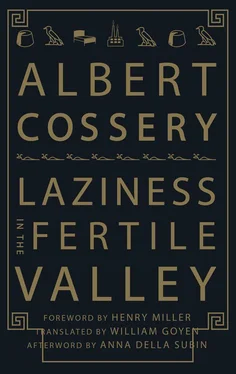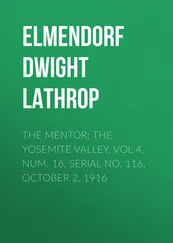Albert Cossery - Laziness in the Fertile Valley
Здесь есть возможность читать онлайн «Albert Cossery - Laziness in the Fertile Valley» весь текст электронной книги совершенно бесплатно (целиком полную версию без сокращений). В некоторых случаях можно слушать аудио, скачать через торрент в формате fb2 и присутствует краткое содержание. Год выпуска: 2013, Издательство: New Directions Publishing Corporation, Жанр: Современная проза, на английском языке. Описание произведения, (предисловие) а так же отзывы посетителей доступны на портале библиотеки ЛибКат.
- Название:Laziness in the Fertile Valley
- Автор:
- Издательство:New Directions Publishing Corporation
- Жанр:
- Год:2013
- ISBN:нет данных
- Рейтинг книги:3 / 5. Голосов: 1
-
Избранное:Добавить в избранное
- Отзывы:
-
Ваша оценка:
- 60
- 1
- 2
- 3
- 4
- 5
Laziness in the Fertile Valley: краткое содержание, описание и аннотация
Предлагаем к чтению аннотацию, описание, краткое содержание или предисловие (зависит от того, что написал сам автор книги «Laziness in the Fertile Valley»). Если вы не нашли необходимую информацию о книге — напишите в комментариях, мы постараемся отыскать её.
Laziness in the Fertile Valley — читать онлайн бесплатно полную книгу (весь текст) целиком
Ниже представлен текст книги, разбитый по страницам. Система сохранения места последней прочитанной страницы, позволяет с удобством читать онлайн бесплатно книгу «Laziness in the Fertile Valley», без необходимости каждый раз заново искать на чём Вы остановились. Поставьте закладку, и сможете в любой момент перейти на страницу, на которой закончили чтение.
Интервал:
Закладка:
He looked at Galal in despair, heaved a sigh and said:
“Galal, my son, wake up. You are the eldest; I count on you to establish order in this house.”
Galal, contrary to all expectations, raised his head and seemed to wake up. He had just been bitten by a singularly active flea.
“What’s that? What did you say?”
“I said that you’re the eldest,” repeated old Hafez. “It’s your responsibility to reason with your brothers.”
“What have my brothers done?”
“By Allah! Don’t you know what went on yesterday?”
“No. How should I know?”
“Well, your brother Rafik acted like a gangster! He nearly killed Haga Zohra.”
“Good for him,” said Galal.
“What?” cried old Hafez. “You approve!”
“It’s a crime,” said Uncle Mustapha.
Uncle Mustapha was sitting in the rocking chair; he shook his head gravely to signify his distress and, from time to time, sighed with despair.
“It’s insane,” he said again.
Galal didn’t answer. He didn’t want to commit himself or begin any interminable discussions. He was already thinking of getting back to bed.
“Galal, my son,” old Hafez began, “I beg of you, wake up for a moment and listen to me.”
“Well,” said Galal. “What is it you want?”
“I want you to talk to your brother Rafik. Tell him for me that if he doesn’t stop his criminal behavior he’ll repent it. I’ll teach him who’s master here.”
Galal remained insensitive to these threatening words. His father’s noisy revival of a show of authority seemed perfectly absurd to him. However, he thought it wise to appear conciliatory. It seemed the best way to get this scene over with.
“All right, Father. Calm yourself. I’ll speak to him one of these days.”
“What do you mean — one of these days? I want you to talk to him today.”
“Really,” begged Galal. “Can’t you wail at least until tomorrow?”
Old Hafez sighed with exhaustion. He had begun to realize the futility of the conversation.
“All right,” he said. “You can speak to him tomorrow.”
Meanwhile, Serag was rummaging in the room off the terrace. He had thought a great deal in the last few days. His unsuccessful attempt to flee his father’s house had put him in an inferior position with his family. Even Uncle Mustapha spoke to him with a certain condescension, as though he were not quite well. He felt like a child who is not allowed out of the house. No one took his desire to work seriously. This attitude offended his rather juvenile nature and was a constant source of torture. He had resolved to show them he was capable of following his plans through, even if he had to suffer poverty and hunger to attain his independence.
Serag now understood that he couldn’t leave the house with any chance of success unless he provided himself with a little money. To get it, he had decided to sell some of his school books, and some of his brothers’ as well, to Abou Zeid, the peanut vendor. This would bring him a bit of cash. Certainly, he didn’t expect a great sum, but the little he would get would help him to live during the first days of his independence, until he could find some work. Abou Zeid, no doubt, would buy his books. In this way he could enlarge his miserable business and, at the same time, become a bookseller, an unknown thing in the quarter. Serag couldn’t get over his marvelous idea. Abou Zeid would be the first bookseller in the quarter. That would raise him in the esteem of honest people.
The terrace room was a dusty little shed, lighted by a skylight, heaped pell-mell with all sorts of kitchen utensils, bits of furniture and discarded objects. Serag knew the books he wanted had been put away in a suitcase. He found it hidden in a corner under a pile of empty bottles and damaged water pipes. He managed to free it, cleared it of some of the dust that covered it, and opened it.
He was moved at this memory of his life as a student and the distant past of his school days. These books represented a magnificent period for him. Then the future had seemed smiling and full of hope. The house had not yet become what it now was: an inviolable retreat of sleep.
He picked up a book and began to leaf through it.
“What are you doing here?”
Serag dropped the book and turned around.
“It’s none of your business, girl!”
“I’ve been looking for you for half an hour,” said Hoda. “Lunch is ready.”
She came up to him slowly, happy to have found him. He recoiled; he feared this little girl more than anything in the world. Her fatal tenderness was an abyss for him, into which he fell each time with despair. This girl, with her obstinate love and her naïve perversity always weakened his instincts for revolt. It was as though with him she was transformed, leaving childhood, to become a wheedling and cynical woman.
“Why are you handling those books?” she asked. “What are you starting now? When are you going to be sensible?”
“Leave me alone. I’m old enough to do what I want.”
“You’re only a child.”
“Ah! I’ll show you if I’m a child,” said Serag. “You see these books? I’m going to sell them.”
“Sell them! What for?”
“To get some money, girl!”
“What are you going to do with the money?”
“With money I can get out of this house,” said Serag. “Now do you understand?”
“So that’s what it’s for,” she said. “Cursed boy! So you’re beginning this madness all over again.”
“I’ve decided to go away,” said Serag. “But this time I’m really serious. With the money from these books I’ll be able to get along until I find some work.”
“Then you’re really going.”
She had tears in her eyes. She had thought he had given up his childish ideas of adventure, and now, again, he was thinking of nothing but running away and roving around the country. She realized how much his obsession blinded him. But what could she do? The only chance of keeping him near her was to leave with him.
“Take me with you,” she said.
“I’ve already told you it’s impossible,” said Serag.
Hoda wiped her tears and became her most seductive; she smiled at the young man, offering him her lips. But Serag turned away. Then Hoda closed the suitcase, sat down on it, and caught Serag’s hand, drawing him to her.
“Come sit by me.”
Serag sank down beside her; he was already helpless, hypnotized. He was never able to resist the perverse attraction that came from her young body.
“You don’t want to take me then?”
“No,” said Serag. “What would I do with you?”
“I’d keep house for you.”
“I’d rather go alone. I don’t need a woman.”
“You’ll be afraid alone. I’ll take care of you.”
“Why should I be afraid? Work doesn’t frighten me.”
“How do you know? You’ve never worked yet. It’s hard to be alone. Don’t you believe that?”
“I don’t know,” said Serag. “Anyhow, anything is better than staying in this house.”
She leaned against him, putting her mouth close to his ear.
“Take me with you,” she pleaded. “Don’t leave me. I’ll kill myself.”
In reality, Serag was beginning to be aware of his fear of leaving for the city alone. The idea of taking Hoda with him no longer seemed so absurd. Actually, the young girl would be a useful companion, and her presence would make the hardships of his new life less painful to bear. Still, he hesitated.
She watched him pondering, her heart pounding. She stroked his cheek, then kissed his mouth.
“Take me.”
“I don’t know yet,” said Serag. “Perhaps I’ll leave with you. We’ll see. First I have to sell these books.”
Читать дальшеИнтервал:
Закладка:
Похожие книги на «Laziness in the Fertile Valley»
Представляем Вашему вниманию похожие книги на «Laziness in the Fertile Valley» списком для выбора. Мы отобрали схожую по названию и смыслу литературу в надежде предоставить читателям больше вариантов отыскать новые, интересные, ещё непрочитанные произведения.
Обсуждение, отзывы о книге «Laziness in the Fertile Valley» и просто собственные мнения читателей. Оставьте ваши комментарии, напишите, что Вы думаете о произведении, его смысле или главных героях. Укажите что конкретно понравилось, а что нет, и почему Вы так считаете.












